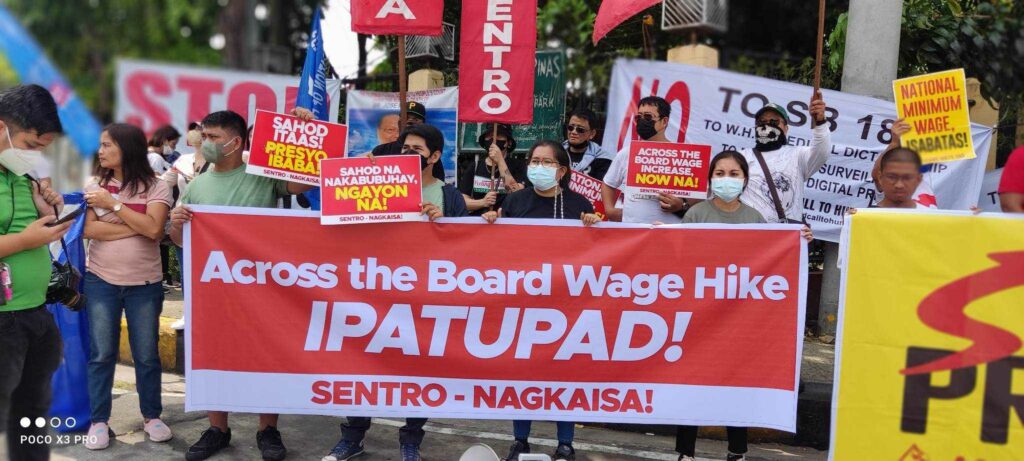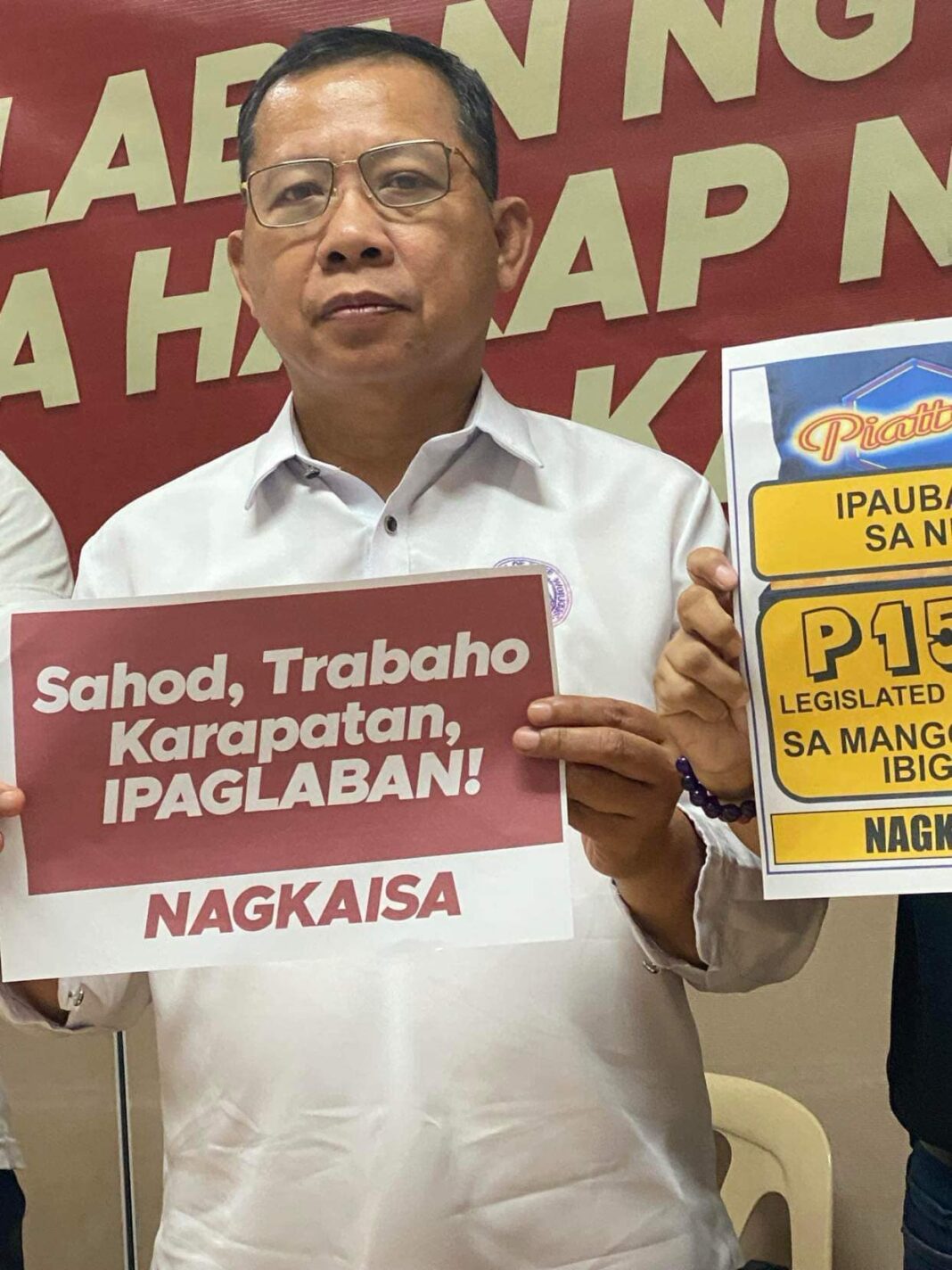The Federation of Free Workers (FFW) is urging the Bicameral Conference Committee in Congress to greenlight a ₱100-₱200 nationwide wage increase—and to make it across-the-board to avoid wage distortions that spark needless labor disputes and lawsuits.
A Bicameral Conference Committee reconciles conflicting provisions of both versions of the Senate and of the House of Representatives. The Conference committee submits the report on the reconciled version of the wage bill, duly approved by both chambers.
“Kung ₱200 mas maganda. Huwag na po nating paikutin, basta mungkahi namin across the board [P200 would be better. Do not give workers the run-around. Just make the wage increase across-the-board] ,” FFW President Atty. Sonny Matula said.
Matula said that not making the increase across-the-board will make it open to wage distortions that cause confusion, disputes, and more cases in court. “Nobody wants that,” he stressed.
ECONOMIC IMPLICATIONS
On June 4, the House of Representatives approved on third and final reading a bill seeking to mandate a P200 hike in the daily wage of minimum wage workers in the private sector.
The Senate previously approved a wage increase version which proposes a P100 daily minimum wage hike. Some Senators, led by Senators Juan Miguel Zubiri and Joel Villanueva, said amenable to adopting the House version.
Labor federations had urged President Ferdinand Marcos Jr. to sign the wage increase bill into law.
In a statement read by Communications Undersecretary and Palace Press Officer Claire Castro on June 5, it was announced that “President Ferdinand R. Marcos Jr. will carefully study the potential economic implications of the proposed P200 increase in the daily minimum wage for private sector workers to ensure that any decision made will strike a balance between the welfare of workers and the sustainability of businesses.”
PERSPECTIVE ON MASS LAY-OFFS
The FFW took issue with the “mass layoff” scare floated by the Philippine Retailers Association (PRA).
“Let’s have some perspective,” said Atty. Matula, who is also the Chairperson of NAGKAISA! Labor Coalition. “A 15% to 31% hike today is smaller than the almost 40% wage increase in 1989.”
The last legislated wage hike in 1989 increased minimum wages from ₱64 to ₱89.
“The economy survived that and in fact, thrived despite a number of coup attempts. Today’s businesses are stronger, profits are up, they have savings through tax reductions and incentives. Workers are long overdue for a raise,” said Matula.
A legislated across-the-board wage increase will also address the widening Inequality and lift millions of working poor out of their miseries according to Atty. Matula.
He further reminded that existing exemptions still apply:
“Retailers with 10 or fewer workers can apply for exemption, enterprises with P3M capital or less and registered under the BMBE law, and businesses employing only family members are exempted—no need to panic,” Matula said.

Finally, FFW had this message for the Bicameral Conmittee: “Dear Bicam members, wag po tayong matakot sa multo ng mass layoff — mas matakot po tayo sa multo ng gutom sa hapag ng mga manggagawa at sa realidad ng pandak at malnourished na mga batang Pilipino. [Do not be afraid of the specter of mass layoff. Be more afraid of the specter of hunger stalking workers and the sight of stunted and malnourished young Filipinos]. The wage hike is reasonable, fair, and needed. Let’s pass it for the people.” Matula said.
PHL: AMONG 10 WORST COUNTRIES FOR WORKERS
For almost nine consecutive years, the Philippines has ranked among the world’s 10 worst countries for workers, according to the International Trade Union Confederation (ITUC) Global Rights Index.
The Workers Rights Watch (WRW)—an international organization that advocates for worker rights and promotes corporate citizenship and good working condition—revealed that “for the duration of the term of former Pres. Rodrigo Duterte, up to the present, there have been at least 105 extrajudicial killings, seven abductions involving 11 persons, 122 victims of trumped up charges, 23 detained labor organizers and unionists, 118 violations of the right to assembly, 156 anti-union activities like union busting, and 341 cases of threats, harassments and intimidations, including red-tagging.”
The WRW report was supported by the European Union through the “Support to Human and Labor Rights Defenders and Securing Civic Space,” Project of the Federation of Free Workers and the Danish Trade Union Development Agency.
“Not a single case of extrajudicial killing of workers has been solved. Not a single suspect has been apprehended. Not one case has prospered except one that government has conveniently labeled as not labor-related,” said Julius Cainglet, Vice President for Research, Advocacy and Partnerships of the Federation of Free Workers (FFW).
The International Labour Conference-Committee on the Application of Standards (ILC-CAS)— a core part of the supervisory system of the International Labor Organization (ILO)—had decided on June 2 to remove the Philippines from the shortlist of 24 countries being called out for violations of ILO Convention 87 on Freedom of Association.
Cainglet said, however, that the Philippines was removed from the list, “not because the conditions of Filipino workers had meaningfully improved. It’s just that workers from other countries are experiencing far more serious problems as in the cases of Myanmar under a military junta and Belarus, where persecution of trade unionists persist.”


